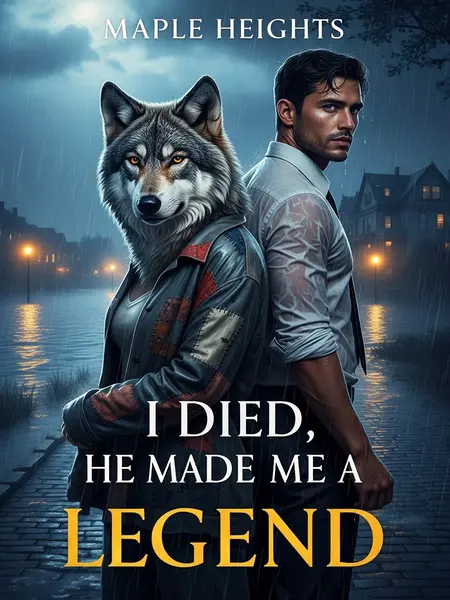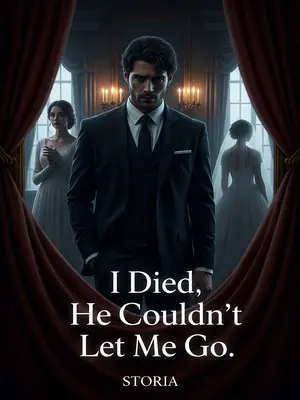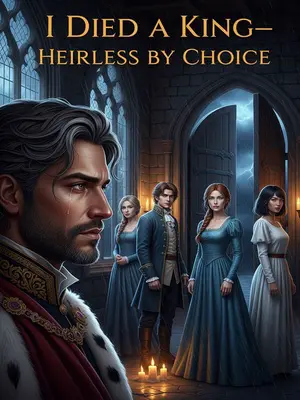Chapter 3: Wolf Girl Plays Sick
So, I settled on “dying of illness.” At least that one sounded more romantic.
There’s a certain romance to it, I thought—pale cheeks, tragic sighs, and soft blankets. I could play the part, easy. I could be the heroine of a sad old movie.
One day, I started coughing. There was blood on my napkin. It looked real enough.
I made sure Caleb was watching, dabbing delicately at my lips, eyes wide and mournful. I’d practiced the look in the mirror—tragic but brave.
Actually, that blood was fake. I’d pulled some fur from a blood-red river otter spirit, ground it into powder, and mixed it with water—the result looked exactly like blood. No one would ever know.
It took some doing, let me tell you. The otter spirit was a slippery little guy, always darting between reeds, but I managed to snag a tuft when he wasn’t looking. Worth it for the effect.
The otter spirit ran off clutching his bald head, threatening to tell my dad. “You’re in trouble now!”
He squeaked and splashed, calling after me, “Wait ‘til your father hears about this!” I just grinned and waved the napkin in the air. Honestly, I was a little guilty, but mostly I felt victorious.
But what could I do? My old man was the one who told me to hurry back to the woods in the first place. What’s a wolf girl to do?
He was always big on family pride, always reminding me where I came from. “You’re a wolf, Savannah. Don’t forget it.” But he never had much patience for human drama, not really.
At first, I wasn’t happy with the color, so I hid those napkins under my pillow. I figured I’d try again tomorrow.
I fiddled with the mixture for days, trying to get the shade just right—deep and dramatic, not too orange. Every artist needs her palette.
One day, Caleb found them. He stood there holding the napkin, his voice thick with worry: “Savannah, what’s going on?”
He looked so serious, standing in the doorway, napkin pinched between two fingers like it might bite him. His brow furrowed. I could see the panic building behind his eyes.
I didn’t say a word, feeling guilty. To him, I just looked frail and sickly.
I wanted to explain, but the words stuck. He reached for me, and I let him, feeling smaller than I had in years.
He pulled me into his arms, voice rough: “It’s all my fault—I’ve been too focused on my state certification exams and neglected your health. From now on, I’ll take care of everything.”
He squeezed me close, chin resting on my head. “You don’t have to do this alone, Savannah. I’m here.” For a second, I almost believed I really was sick—just so I could stay in his arms a little longer.
So, the next day, I didn’t even have to cook anymore. Not that I minded.
Caleb rolled up his sleeves, determined to take over the kitchen, even though he couldn’t tell a spatula from a soup ladle. The man had grit, I’ll give him that.
Not that I ever cooked, anyway.
Truth be told, the stove was more for decoration than anything else. I’d always found ways around the whole “domestic goddess” thing. No shame in that.
Every day, I’d go down to the lakeshore and call for the raccoon spirits. They’d pop up, transform into mom-like housekeepers, clean my house, and whip up a table full of home-cooked food. It was almost too easy.
The raccoons had their own secret recipes—cornbread so fluffy it melted on your tongue, green bean casserole better than any state fair. The kitchen sparkled, the laundry folded itself, and all I had to do was whistle. Life was good.
Caleb never knew—he always thought I was the one keeping the house so tidy.
He’d brag to his buddies at the diner, “Savannah’s got the magic touch. I don’t know how she does it.” If only he knew.
Now, I didn’t even have to walk to the lake anymore. Talk about luxury.
The raccoon spirits had gotten used to my calls—they started showing up before I even finished asking. One even left a tiny note on the fridge: “Rest up, Miss Wolf. We got this.”
Rubbing my steadily rounder belly, I lost the last bit of motivation to move. Who could blame me?
My jeans got tighter, and I started wearing Caleb’s old sweatshirts just to hide the evidence. Laziness is a slippery slope, especially when the food’s this good.
Meanwhile, Caleb threw himself into the kitchen and finally understood the headache of daily chores—he even thought it was harder than prepping for his certification tests. I had to laugh at that.
He burned the toast, set off the smoke alarm twice, and managed to make a pot roast that was somehow both raw and overcooked. But he kept trying, bless his heart.
Sometimes, he’d look at me with pity and say, “Savannah, I never realized how much you did before. You’ve worked so hard.” He meant it.
I’d mumble something about it not being a big deal, feeling the guilt settle in my stomach like a stone. He’d ladle out chicken soup, insisting I eat every drop.
I’d break out in a cold sweat from guilt, and he’d press a warm mug into my hands. “Look at you,” he’d murmur, “still breaking out in cold sweats.” He never let up.
He’d smooth my hair back, worry etched deep into his face. “You need to rest, Savannah. Don’t worry about a thing.”
But no matter how attentive Caleb was, my cough never got better—only worse. He started to look haunted.
He started keeping a notebook, tracking my symptoms, marking the days with red ink. He wasn’t about to let me slip away without a fight.
He brought in doctor after doctor, but none could figure out what was wrong with me. Caleb tried them all, desperate for a cure.
Of course not—it was all an act.
I felt a twinge of guilt every time I watched him pace the hallway, phone pressed to his ear, voice tight with worry.
I’d discovered a new lifestyle: total couch‑potato mode. So I lay in bed all day, meals brought right to me. It was a new skill, but I picked it up fast.
I’d heard it from the raccoons—it was the new trend to just check out. I figured, why not give it a try? I became a champion at it, barely moving except to eat or nap.
Every day, I wrapped myself up tightly, making sure Caleb wouldn’t notice I was secretly getting chubbier under the covers. I was pretty good at hiding it.
I kept my back to the window, blankets pulled up to my chin, pretending I was cold. Really, I just didn’t want him to see the new roundness in my cheeks.
Every day, he’d see me curled up in bed like a little bird, and his heart ached more and more. Poor guy.
He’d sit on the edge of the bed, stroking my hair, whispering that everything would be okay. I could see the worry lines deepening around his eyes.













